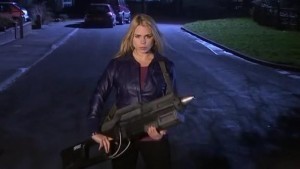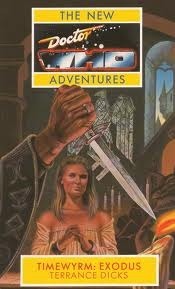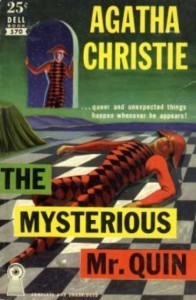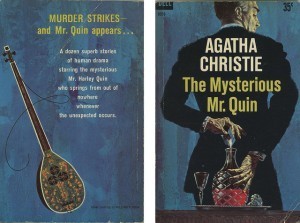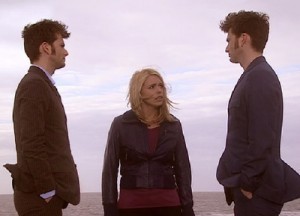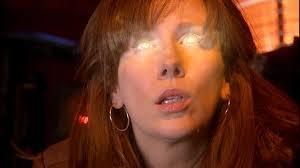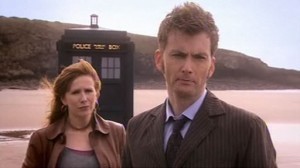Tansy Rayner Roberts's Blog, page 79
June 4, 2013
Why It’s Important (And Why We’re Still Talking About the SFWA Bulletin)
 I’m coming in late to discuss this particular issue on the blog, for one fairly specific reason – as a member of the SFWA and an incoming Board member (I don’t officially step up to my position as overseas regional director until July but it’s hovering there on the horizon), I’ve been spending a lot of time on the private member forums, discussing the issue, reading member comments and joining in the plan for ‘where to go from here’ as far as making constructive change to the SFWA publications. I’m also trying to figure out in my own head the delicate balance of ‘conflict of interest’ as far as me personally making any kind of public contribution to the discussion. Which is, I imagine, something I’m going to have to get used to.
I’m coming in late to discuss this particular issue on the blog, for one fairly specific reason – as a member of the SFWA and an incoming Board member (I don’t officially step up to my position as overseas regional director until July but it’s hovering there on the horizon), I’ve been spending a lot of time on the private member forums, discussing the issue, reading member comments and joining in the plan for ‘where to go from here’ as far as making constructive change to the SFWA publications. I’m also trying to figure out in my own head the delicate balance of ‘conflict of interest’ as far as me personally making any kind of public contribution to the discussion. Which is, I imagine, something I’m going to have to get used to.
For those of you just joining us on this one, you can probably catch up on the SFWA Bulletin topic by looking at this link post from Jim Hines (and whoa, he’s been updating that one, so many links, a very useful page to direct anyone to who thinks that the anger about this issue belongs to a ‘minority’), the column under discussion scanned here, and especially Foz Meadows on “Old Men Yelling at Clouds” – a breakdown explaining exactly what was wrong with the Resnick/Malzberg column, point by point, so no one else has to.
The SFWA’s official response (so far) includes an announcement of a task force to address problems with the Bulletin, and the President, John Scalzi, taking responsibility for (but not in any way defending or excusing) the recent issue.
If anyone is wondering, by the way, why a whole task force might be necessary, I would direct you to Mari Ness’ excellent breakdown on the many ways in which The Bulletin hasn’t been meeting its own stated mission, let alone the needs of the SFWA membership. There’s a lot of work to be done here, and it’s far too much to put on the shoulders of a single person.
So, that’s the background.
It’s not news that there is still sexism lingering in publishing/writing communities, both of the overt and insidious variety (and indeed, of the deliberate as well as the accidental, which can both be damaging) and that the long-standing tradition of turning a blind eye to the behaviour or old-fashioned opinions of some professionals because of their past work is coming around to bite us. Because, that word ‘professional’ means something else now, in most workplaces. It comes with a different set of behavioural expectations and responsibilities than it did even a decade ago, let alone several decades.
But what I have found especially interesting (and heartening) this week, in the wake of this issue being discussed so robustly, is how many people have taken the opportunity to write posts extending the issue of sexism in the SF community further, beyond this one instance. Which is important, to demonstrate that it’s never about this one thing. Sexism is never an isolated incident – as soon as we treat it that way, as an outlier rather than a symptom of society – then all it takes is one well-chosen excuse and the matter will be brushed under the carpet.
But this is why it matters that a professional industry journal should not publish a piece, even a deliberately backwards-looking opinion piece, which belittles and patronises women:
Because women often hold back from speaking up publicly about issues that affect and distress them, out of fear that their peers will not support them, and their professional image will suffer. Despite the fact that the things they are hesitant to speak about (like being ignored or shouted down at conventions) are ALSO damaging to their professional image.
Because when women speak up in public, they are often told to shut up in the most revolting language. I don’t mean language like ‘that thing you said was demeaning and disrespectful.’ Pornographic, degrading and violent language.
Because when women write things men don’t like, they have often dismissed as ‘bad’ writers.
Because all these things have been happening for a very, very long time, and we should be done with it by now. The fact that we’re not done with it is something of a shock, all over again, every time. Sometimes it feels like a betrayal, sometimes an embarrassment, often both.
I think the most important, positive and critical piece I have read on this whole big mess in the last week is this one, from K Tempest Bradford: Demanding the Best.
Thank you to everyone who has been speaking up this week and making your voice heard. It feels like our community is a better and more supportive environment in which to do this than ever before (yes, despite the despicable hate mail), and that is because SO MANY people are standing up together, saying ‘this isn’t okay’ and helping to take responsibility for making things better into the future. And while it often bugs me to see men given brownie points for saying the same things women have been saying for years, I think that the crowd of supportive voices from male peers saying ‘sexism in our industry is not okay,’ commenting and linking and endorsing the posts by women, has been crucial because it shows, hey, this isn’t just a gender thing, or a ‘lady writer’ thing. It affects all of us.
We as a community deserve better, and we as a community CAN work to do better. To be more inclusive, more respectful of everyone (where ‘respect’ does not mean turning a blind eye to bad behaviour or destructive attitudes), and more vocal at supporting those who need it.
Check out Adweek’s recentcoverage to see how in incident like this damages not only the reputation of the SFWA but science fiction/fantasy as an entire genre. Yep. That’s how the world sees us. There’s more work to do.
June 3, 2013
Love, War and Bernice Summerfield [WHO-50—1992]
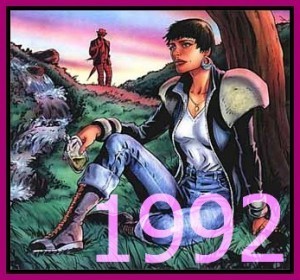 I first met Bernice Summerfield in the pages of Doctor Who Magazine, illustrated with some vivid comic book style art showing us a smart, futuristic adventurer with short black hair and a blaster. It wasn’t new for original companions to be created for Doctor Who spin off material – it had been happening in the comics for years, not to mention the stage plays and Choose Your Own Adventure novels. But the show was to all intents and purposes off the air, and there was a big push for fans to look upon the continuing series of books as The Real Canon of the show.
I first met Bernice Summerfield in the pages of Doctor Who Magazine, illustrated with some vivid comic book style art showing us a smart, futuristic adventurer with short black hair and a blaster. It wasn’t new for original companions to be created for Doctor Who spin off material – it had been happening in the comics for years, not to mention the stage plays and Choose Your Own Adventure novels. But the show was to all intents and purposes off the air, and there was a big push for fans to look upon the continuing series of books as The Real Canon of the show.
Bernice, then, was a Real Companion, and Doctor Who Magazine at least put in a major effort in helping the fans accept her as such. Created by Paul Cornell, who also wrote her introductory novel, Love and War, Bernice was sold to us as an older female companion (gasp, 30!) with a professional background: she was an archaeologist with a snarky sense of humour (did we say snarky back then? I don’t think we did) and a keen intelligence who liked a drink, and wasn’t going to let the Doctor mess her around.
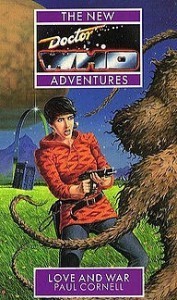 Meanwhile, Love and War also wrote out Ace, giving her yet another dead boyfriend as the straw that broke the camel’s back as far as her relationship with the Doctor was concerned (even her vaguely potential love interests in the show tended to keel over or turn out to be villains or both). It was sad to see Ace leave on such a sour note, even if her return was already planned, but it followed the continuing path that the New Adventures writers had created for her as a character – that of a gnawing distrust and resentment about the Doctor and his increasingly manipulative way of dealing with the problems of the universe.
Meanwhile, Love and War also wrote out Ace, giving her yet another dead boyfriend as the straw that broke the camel’s back as far as her relationship with the Doctor was concerned (even her vaguely potential love interests in the show tended to keel over or turn out to be villains or both). It was sad to see Ace leave on such a sour note, even if her return was already planned, but it followed the continuing path that the New Adventures writers had created for her as a character – that of a gnawing distrust and resentment about the Doctor and his increasingly manipulative way of dealing with the problems of the universe.
When Ace returned, it would be as a leather-clad Dalek hunter who at her best was pretty kick-ass and at her worst resembled something not far off Kate Beaton’s comic about Strong Female Characters. Big Finish Audio would later do a MUCH BETTER job of showing Ace as a grown up.
Meanwhile, Bernice Surprise Summerfield was a breath of fresh air. The New Adventures writers certainly seemed to appreciate her as a new character who fitted the ‘adult’ mode of the new books without having to be pulled out of shape. Her relationship with the Doctor had far more of an air of equality to it, and her 24th century origins coupled with an archaeologist’s interest in the 20th century gave her a solid grounding through the books, which began to build an ensemble of regular/recurring characters and settings along with the stable of regular authors.
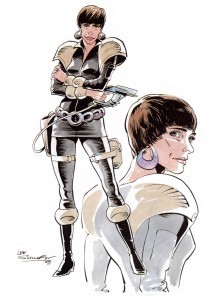 The New Adventures were specifically aimed at an adult rather than family audience, and so Benny was designed to appeal to those adult readers. Thus she could be more cynical and flawed than had been required of the more innocent 80’s TV companions. She could tell dirty jokes, drink too much beer, puncture egos and so on. Even the fact that she was a Professor put her on more of an equal footing with the Doctor (though her credentials were at least partly forged)
The New Adventures were specifically aimed at an adult rather than family audience, and so Benny was designed to appeal to those adult readers. Thus she could be more cynical and flawed than had been required of the more innocent 80’s TV companions. She could tell dirty jokes, drink too much beer, puncture egos and so on. Even the fact that she was a Professor put her on more of an equal footing with the Doctor (though her credentials were at least partly forged)
Around the same time that Love and War was released in late 1992, Benny Summerfield also joined the Seventh Doctor in the Doctor Who Magazine comic strip. The combination of media made her feel even more ‘arrived’ as an official companion – part of The Canon if such a thing even existed anymore (oh, who am I kidding, it totally did).
No other non-TV Doctor Who companion has ever had the same impact that Benny did. Not only did she appear in the majority of the New Adventures novels from 1992-1997, but she continued on with her own book series at Virgin after the BBC took the license back, and then began a successful audio series at Big Finish that continues today, with at least twelve seasons of audio adventures starring Lisa Bowerman as Bernice.
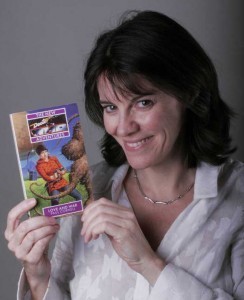 Big Finish celebrated Benny’s 20th anniversary last year with two plays: Many Happy Returns, a celebration of the characters long and complicated life and backstory, and a full cast dramatisation of the novel that started it all, Love and War. Considering how hard (and expensive) it is to track down the New Adventures books these days, this is probably the best way to experience Bernice’s origin story for yourself, not least because of the voice support of Sylvester McCoy and Sophie Aldred in bringing Cornell’s novel to life.
Big Finish celebrated Benny’s 20th anniversary last year with two plays: Many Happy Returns, a celebration of the characters long and complicated life and backstory, and a full cast dramatisation of the novel that started it all, Love and War. Considering how hard (and expensive) it is to track down the New Adventures books these days, this is probably the best way to experience Bernice’s origin story for yourself, not least because of the voice support of Sylvester McCoy and Sophie Aldred in bringing Cornell’s novel to life.
I’d love to hear of any readers’ experiences with Bernice as a character in the novels, or later in the audios. Which is your favourite of her stories? Personally, I can’t go past the bizarre hilarity of Kate Orman’s take on the character in Return of the Living Dad, but these days it’s audio Bernice who has won my heart.
ELSEWHERE ON 1992:
Love and War [Doctor Who Book Club Podcast]
Shada [Wife in Space]
PREVIOUSLY:
New Who Series Four Report Card: Tansy
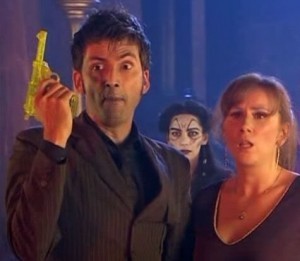 You can find David’s report card and Tehani’s report card for this season on their websites.
You can find David’s report card and Tehani’s report card for this season on their websites.
The Doctor: David Tennant
I think that with only a few exceptions (The Girl in the Fireplace being a pretty major one) the Tenth Doctor is at his most happy and likeable in this season, with Donna at his side. I was all for a bit of romantic frisson shaking up Doctor Who after so many (Classic) years with a frustrating lack of it, and yet by the time Donna came around, I was pretty sick of companions and potential companions (let’s not forget poor old Astrid) making goo goo eyes and kissy face at the Doctor. Donna was exactly what he needed, and he was exactly what she needed too. Their friendly partnership, banter and teasing was just so lovely on screen, and she did the job he needed – adding the humanity to the mix – often in ways he didn’t expect, which kept everything fresh. Tennant brought his usual blend of manic adventurer and caring humanitarian to this season, and he was EVEN more fun when there were two of him. Right up to the end…
The Companions:
Donna Noble: Catherine Tate
She didn’t think she was special, but we knew otherwise. Catherine Tate managed to take a fairly unforgiving comic role from The Runaway Bride and added so much depth to it! Donna is lovely, fierce and proud and hilarious. A damn good companion, my favourite of the RTD era, and I never stop being angry about the way her story ended.
Recurring Characters:
Martha Jones: Freema Agyeman
Lovely to see her back, a qualified doctor, and making her own way in the world. Also worth noting that she had a great spell on Torchwood during this year as well, which helped cement her friendly relationship with Jack as well as give her some further ‘hard yards’ experience. She and Catherine Tate had great chemistry together and I’m glad that they got to spend time in each other’s company. The scene in which Martha comforts her own clone is probably an acting highlight. I also feel that her development as a military doctor was a realistic response to her experiences late in the previous season, which led to the stiff-upper-lip heroics of The Stolen Earth.
That reappearance at the tail end of Partners in Crime was such a big deal! I liked very much that while Rose’s return was teased through this season, it didn’t overshadow Donna and her journey… well, not until that scene on Bad Wolf Bay, anyway. But she came back strong and compassionate as ever, a grown up hero, and I enjoyed this version of Rose very much. There was almost a ‘Rose Tyler: Defending the Earth’ TV spin off, and I think it’s pretty easy to see how well it might have worked if they hadn’t decided ‘yeah, one too many, let’s not over egg the pudding.’ Her highlight was in Turn Left, though – I’m just soppy enough to enjoy her reunion with the Doctor, but actually the best bits were leading up to it, while the reunion moment itself was a bit awkward as if we shouldn’t REALLY be watching it…
Sarah Jane Smith: Elisabeth Sladen
Lovely as ever, I’m so glad she was included in this gathering of the companions. I think this was actually the first time I saw a glimpse of Luke and her spin off background, though I later came to greatly enjoy the Sarah Jane Adventures (David I suspect you will enjoy those a lot more than Torchwood…). I still haven’t been able to bring myself to watch that last season because of the loss of Elisabeth Sladen but it’s nice to see her here and that she gets to be brave as well as vulnerable. Less of a sense of ‘I waited for you and you never came’ – look at how much her life has changed in just a couple of years since we saw her in School Reunion!
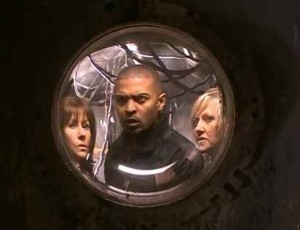 The boys are back in town: Jack Harkness (John Barrowman) & Mickey Smith (Noel Clarke)
The boys are back in town: Jack Harkness (John Barrowman) & Mickey Smith (Noel Clarke)
Neither have especially changed since we saw them last – especially as those of us watching Torchwood concurrently had only seen Jack about five minutes ago – but they’ve evidently been through a lot, and both seem a lot more grown up. It was nice to see Jack and what’s left of his Torchwood family come face to face with that pesky Doctor he was always mooning over, and I especially enjoyed the interactions between Jack and Sarah Jane, and Jack and Donna. Mickey has moved on from Rose and is enjoying his own role as a kickass Defender of the Earth, and it was nice to see him breeze past the Doctor and pick his own universe, thanks very much.
A little sad to see Jack, Martha and Mickey walk off arm in arm knowing that we have to just imagine their adventures together, because neither Freema Agyeman or Noel Clarke were available when Torchwood: Children of Earth was being filmed. Mind you, considering the body count in that damned series, maybe we should be grateful for that…
I do like the fact that Martha and especially Mickey have formed a friendship with Jack now, all bonding over, well, NOT being the Doctor’s companion. Seeing Jack teasing Mickey at the end was almost as cute as seeing him checking out Sarah Jane in the previous episode, and her giving him a stern talking to about Torchwood’s gun-happy attitude.
Donna’s family – Wilfred Mott (Bernard Cribbins) and Sylvia Noble (Jacqueline King)
Both fabulous actors who gave Donna a whole lot of context. Not sure if we mentioned before that they brought in Wilf (expanding his role as newspaper seller from Voyage of the Damned) as a last minute replacement for Donna’s Dad, as the actor had unexpectedly died since The Runaway Bride. The quiet, mostly-unspoken loss hangs over the family and adds extra poignancy to Sylvia’s character in particular. But it’s Wilf who was something new – previously, the companions’ families were the things pulling them back to Earth, so it was rather lovely that Donna had a granddad who was so damned delighted to see her seeking the stars. If anyone HASN’T seen the Peter Cushing Dalek movies, and you like Bernard Cribbins, you’re in for a bit of a treat when you go back and look at The Dalek Invasion of Earth.
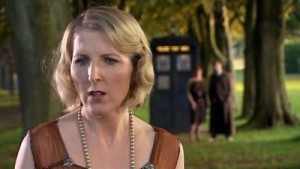 What is your favourite episode of this season?
What is your favourite episode of this season?
The Fires of Pompeii because, Rome, and Donna being fabulous, and the TARDIS gives them all accents, and Peter Capaldi, and ROME, and the Doctor and Donna truly perfecting their double act. I also have a soft spot for The Unicorn and the Wasp.
Least favourite episode?
I struggle to like The Doctor’s Daughter despite the many good bits in it that I always forget about. But I feel I should register Journey’s End as my protest vote. Not cool, Russell T.
Favourite guest performance?
It has to be Alex Kingston as River Song, surely – and yet, she doesn’t feel like a guest to me! So I’m going to discount her for REASONS NOT TO BE DISCUSSED IN FRONT OF DAVID and go with the fabulous Fenella Woolgar as Agatha Christie.
Describe this season in one word!
Joyous.
Grade: A
PREVIOUS “New Who In Conversations”
“Rose”, S01E01
“Dalek”, S01E06
“Father’s Day, S01E08
“The Empty Child/The Doctor Dances”, S01E09/10
“Bad Wolf/The Parting of the Ways”, S01E12/13
Series One Report Card – David, Tansy, Tehani
“The Christmas Invasion,” 2005 Christmas special
“New Earth”, S02E01
“School Reunion,” S02E03
“The Girl in the Fireplace”, S02E04
“Rise of the Cybermen/Age of Steel”, S02E05/06
Army of Ghosts/Doomsday, S02E12/13
Series Two Report Cards: David, Tehani, Tansy
“The Runaway Bride”, 2006 Christmas Special
“Smith and Jones”, S03E01
The Shakespeare Code & Gridlock, S0302-03
Human Nature/The Family of Blood S0308-09
Blink S0310
Utopia / The Sound of Drums / Last of the Timelords S0311-13
“Voyage of the Damned,” 2007 Christmas Special
Series 3 Report Cards: David, Tehani, Tansy
Partners in Crime, S0401
The Sontaran Stratagem/The Poison Sky, S0405 S0406
Silence in the Library/Forest of the Dead, S0408 S0409
Turn Left, S0411
The Stolen Earth/Journey’s End, SO412-13
June 2, 2013
XX-Men
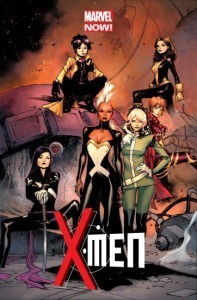 The new X-Men series caught my attention because of the all female line-up. All female characters, that is, as both the writer and artist on the series are in fact male. Intriguing then that it’s the female editor of the series, Jeanine Schaefer, who has been doing the promotional rounds to talk up this book.
The new X-Men series caught my attention because of the all female line-up. All female characters, that is, as both the writer and artist on the series are in fact male. Intriguing then that it’s the female editor of the series, Jeanine Schaefer, who has been doing the promotional rounds to talk up this book.
So far I’ve spotted interviews with Jeanine at Bitch, The Mary Sue and Jezebel.
For a start, this tells me that Marvel are actually interested in getting the attention of a female readership as well as the ‘default male’ comics fans, which is rather nice to see. It doesn’t hurt that the awesome cover of #1 shows the ensemble cast fully dressed, and posed in reasonably practical and character-specific ways. I kind of love the way they’re all eyeballing the camera with different shades of suspicion and/or friendly challenge.
The interviews with Schaefer are worth reading – she’s obviously very creatively invested in the comic and it’s pretty cool to hear such in depth perspectives from the comics editing side of things – we don’t often get an insight into that world except to some extent through the letters column of any given comic, and considering that there are far more women editing comics than writing or drawing them at the Big Two, it’s pretty cool to see X-Men through Schaefer’s eyes.
But what of the comic itself? So far only one issue has been released and I have to say, I really enjoyed it. The art is very pleasing – not your standard bright superhero style, but Olivier Coipel captures the women nicely, managing to give them character as well as a striking visual style – I particularly like his warrior mohawk take on Storm, Rachel Grey’s armour and a classic-looking Jubilee.
Speaking of Jubilee – as someone who first came to the X-Men thanks to the 90′s animated series, I am SO GLAD to see her being written and drawn something like the character I remember (just the right amount of angsty) instead of as a wisecracking emo depressive vampire. Her current plotline, with her seeking sancturary while caring for an abandoned baby, is compelling and I really like that she is the centre of the first storyline. She was the POV character back in the 90′s, too! Back then, I couldn’t find any way into the X-Men comics that was remotely as comprehensible as the TV show.
So yes, I’ll be following this comic with great interest. The only character in it that I haven’t especially read much about in the past is Psylocke, whom I’m only familiar with from an old bash-em-up Playstation game I used to enjoy, but she’s very promising so far, and the balance of powers in the team is pretty awesome. Plus I love that Rogue is the ‘bruiser’ of the ensemble, and any comic that has her front and center without focusing on her shagging Magneto is a good thing in my book.
This could well be the comic that gets me reading X-Men regularly. Let’s see how it goes!
May 30, 2013
Friday Links Was Not at Wiscon, Dispenses Anti-Writing Advice Instead
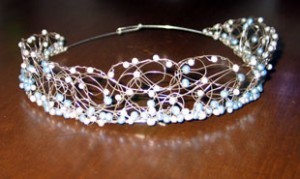 Not being at Wiscon is a constant state for me – though of course it becomes quite specifically sad on that weekend every year when other people ARE at Wiscon. I always enjoy reading the con reports, speeches and so on, and later delight in ordering the Wiscon Chronicles, a fantastic project which does a very good job of making you feel like you were ALMOST there.
Not being at Wiscon is a constant state for me – though of course it becomes quite specifically sad on that weekend every year when other people ARE at Wiscon. I always enjoy reading the con reports, speeches and so on, and later delight in ordering the Wiscon Chronicles, a fantastic project which does a very good job of making you feel like you were ALMOST there.
This year, I direct you towards the extraordinary speech from one of this year’s Tiptree Award winners, Kiini Ibura Salaam: Doing What We Can. If you are ever depressed about your writing or where you are going professionally, and the stories about people managing to write novels while also hanging upside down from a rope, juggling three children and winning Nobel Prizes for science are DEEPLY IRRITATING to you rather than inspiring, then this is the speech for you. Kiini has also written a lively con report about her Wiscon/Tiptree experience and I don’t know about the rest of you, but her blog just went straight into my RSS reader!
But let’s talk about writing advice. Normally the internet is packed from wall to wall with writing advice that makes me annoyed or angry, but this week it’s full of sensible people debunking writing advice in entertaining ways. Hooray!
Charlotte Nash talks about Project Based Writing as a sensible, flexible alternative to Do What Heinlein Did, It Worked For Him And Therefore Is Perfectly Suited To Everyone which is, let’s face it, the internet’s default advice about writing when it’s not banging on about Hemingway and adverbs.
Let’s chase that up with Tobias Buckell’s splendidly named piece, Why 90% of the Advice About Writing Is Bullshit Right Now.
If you’re feeling properly warmed up, I’d like now to usher to towards the spectacular and unapologetically ranty Judith Tarr, with her three-part blogstravaganze Escaping Stockholm. The link is to the combined piece but I recommend reading it in the original three segments as the structure is beautifully laid out. Judith has been around the book publishing business for a very long time, and is writing out of a building horror at how many new/young/midlist writers are now churning out multiple books a year under worse and worse conditions for the publishers to which they are contracted. This is a marvellous piece of writing, which shares a much longer historical perspective building up to the current state of flux the publishing industry is in, and how conditions have changed in positive and negative ways for writers. It’s fascinating. Read all of it, and send your friends/authors/students/fellow sufferers to read it too.
Random glorious internet thing of the week: kids taking part in an after school car-rebuilding-project (adapting gasoline engines to electric ones, already pretty awesome as after-school projects go) were challenged to design a car that could run on Facebook likes and Twitter re-tweets.
Now, gender stuff. It wouldn’t be a Friday Links without gender stuff, right? Ms Magazine looks at school dress codes, and the messages being sent to young girls about their bodies, the clothes they are supposed to wear, and their “responsibility” towards people who might be “distracted” by how they clothe themselves. The comments involve some interesting discussion from different perspectives, though I can’t promise it hasn’t turned into a steaming mess since I last looked at it. Tread carefully.
Kate Elliott answers the question of whether it is difficult for her to avoid using the traditions of male gaze in her fiction.
On SF Signal, an interesting thought piece in response to recent essays on gender and female warriors, from the perspective of one male writer inspired to do things differently, and how he is trying to address those issues in his work.
I also really enjoyed this love letter to Persephone Books, a publisher so awesome and stylish that I have been crushing on them from afar for some time.
Bitch Magazine looks at Three Ways Star Trek Needs To Change – which, yes. Basically, yes. If I go to an awesome explosion-heavy movie with Benedict Cumberbatch and Zoe Saldana, I don’t actually want to spend the next three days ranting about mini-skirts. I have better things to do with my time!
The big event of the week is the new Anita Sarkeesian vid, Part II of her Damsels in Distress in Videogames series. Excellent stuff, as always. The vid is the perfect medium for this kind of discussion, and I really hope they will be taken up as teaching resources, to raise discussion about gaming etc. in the classrooms. Sadly, as noted in various places, Sarkeesian continues to be harassed and her work targeted by people who don’t believe she should be allowed to talk in public.
It’s long but good! My only complaint is that I think she misrepresents the character of Calhoun from Wreck-It Ralph, suggesting that the reversal of the ‘revenge after lover dies’ gender trope is done just for comic effect. That movie is doing some very clever and subversive things about gender that we don’t normally see in kids movies, and there’s a big difference between using gender-reversal for humour, and using humour to point out gender issues in pop culture.
May 29, 2013
E-Trifles for E-Everyone!
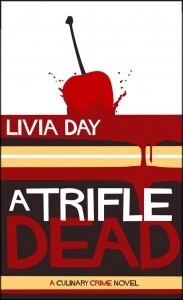 A Trifle Dead by Livia Day (that other author who lives inside my head) is now available across various platforms as an e-book. Hooray!
A Trifle Dead by Livia Day (that other author who lives inside my head) is now available across various platforms as an e-book. Hooray!
You can pick up a copy at the Twelfth Planet Press website, at Wizard’s Tower Books, Weightless Books, Kobo and Amazon.
If you regularly use any of these platforms, please consider rating or reviewing the book to help get the word out there!
FROM GOODREADS:
“I lived in Hobart for 8 years, so the setting was both familiar and humourously drawn. In fact I found the whole book an hysterically funny mix of food, pop culture, glitter and of course, dead bodies. I am now waiting on tenter hooks for the next of Tabitha Darling’s adventures in cookery and crime.” (Elanor)
“Lots of fun – easy to read, an engaging heroine and well-realised plot.” (Liz)
“I loved the use of Hobart as a character in the book (and I could only think of it as a character). Day does an excellent job conveying the sense of the city, and for those of us on mainland Australia used to thinking of Tasmania as some kind of backwater, it was a real eye opener.” (Mark)
“A not-overly gruesome murder mystery with Hobart beautifully rendered by someone who clearly loves it.” (Catherine)
“A very fun and enjoyable armchair mystery set in Hobart.” (Maureen)
“Day has made Hobart seem waaaay more interesting than most mainlanders would assume. I think my favourite bit is the Botanical Gardens description – and if she made up those bits, I’m going to be very cross.” (Alexandra)
“It’s a good plot. I found the book a really entertaining read which met the requirements of a crime novel lover like me and gave me a welcome break from Dickens, James and Woolfe!” (Alexandra’s Mum)
“Haha, I’m not letting myself read it until after I’ve finished my boring filing. DON’T WANT FILING. WANT TRIFLE.” (Thoraiya)
May 27, 2013
Genesis of the Timewyrm [WHO-50—1991]
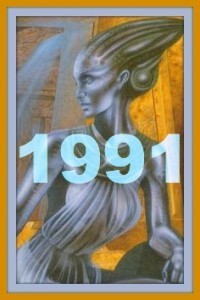 1991 was the year of Doctor Who novels. Virgin Publishing had purchased Target books a few years earlier, which Doctor Who fans remember for the long line of excellent novelisations which we had instead of videos back in the day. Editor Peter Darvill-Evans had tried to get the license for Virgin to publish original Doctor Who tie-in novels, but this was refused until the cancellation of the show was official.
1991 was the year of Doctor Who novels. Virgin Publishing had purchased Target books a few years earlier, which Doctor Who fans remember for the long line of excellent novelisations which we had instead of videos back in the day. Editor Peter Darvill-Evans had tried to get the license for Virgin to publish original Doctor Who tie-in novels, but this was refused until the cancellation of the show was official.
So in 1991 a mini-series of four linked novels was released to test the market. The Timewyrm series: Genesys, Exodus, Apocalypse and Revelation were written by John Peel, Terrance Dicks, Nigel Robinson and debut author Paul Cornell.
I ate these books up with a spoon when they came out. I was thirteen, I had pocket money (which I was supposed to spend on clothes, sorry Mum!) and I wanted more Ace and the Seventh Doctor. With these books, I got my wish. I remember very clearly that I loved Genesys and Exodus, was ‘meh’ about Apocalypse, and was confused, disorientated and slightly alienated by the much weirder and more experimental Revelation, which broke the mould from a literary point of view and is the one of the four that other fans tend to get most excited about.
Later on, as the New Adventures (and Ace in particular) got a lot darker, angstier and more WEIRD, I did rather blame Paul Cornell for starting them all off on that particular track. Sorry, Paul. I’m pretty sure I forgave you once Bernice Summerfield turned up.
So. Timewyrm: Genesys. The first of a series of books that would define Doctor Who for the next five years, and a medium that would define Doctor Who for more than a decade. Does it stand up to a re-read, what with all those things about feminism I’ve learned over the last 21 years? LET’S FIND OUT.
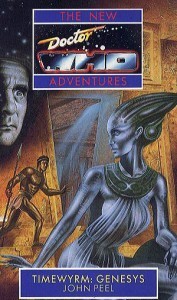 TIMEWYRM: Genesys
TIMEWYRM: Genesys
By John Peel
Virgin Publishing, 1991
Ace, at least, comes across fairly clearly and believably as a character – though I note that she is not only naked in the first scene she appears in, but also spends time checking herself out in the mirror.
The Doctor, however, is a bit of a dick – and I don’t mean the dark and manipulative aspect which I am fine with as part of the ongoing Seventh Doctor portrayal. He’s actually surprisingly cruel to Ace in a way he never was in the TV show – it feels far more like the Six-Peri dynamic rather than the sweet, fatherly friendship that the Doctor and Ace display in seasons 25 and 26. Not only does he accidentally erase her memories at the beginning of the book, but when he realises what he has done he is entirely callous about it, and rude in the face of her extreme vulnerability.
Later, when they are in the city, Ace confides in him that she is uncomfortable with the two of them sharing a room with the lusty, violent and arrogant hero-king Gilgamesh, and the Doctor is entirely unconcerned, suggesting that if she’s so worried “about her virtue” then she’s free to walk back to the TARDIS alone. Despite there being wild lions about. He then spends the rest of the book blithely and repeatedly leaving Ace alone in uncomfortable situations with Gilgamesh, often when the hero-king is drunk.
Yep. He’s a DICK.
The little evidence that the Doctor has any fondness at all for Ace comes from his internal thoughts, most of the rest of which are wrapped up in continuity references to previous stories. It’s interesting, though, because I seem to recall ‘stay out of the Doctor’s head’ being a key element of those much-publicised writers guidelines for the New Adventures.
As the book continues, further dickishness emerges. When he and some of their new friends are sneaking into the temple, it’s not only the Doctor’s suggestion that former priestess En-Gula bares her breasts in order to be ‘undercover’ as the sacred prostitute she used to be, but he thinks some very uncharitable things about the haughty princess Ninani when she refuses to do the same.
Don’t let the fact that it might save all our lives influence you, the Doctor thought.
Also, when the Doctor and Ace leave Mesopotamia at the end of the story, and she has a fleeting moment of satisfaction at seeing peace brokered between Gilgamesh and the king, and the happy position in which they are leaving their friends, the Doctor punctures this by using his knowledge of history to point out all the bad things that are going to happen to nearly everyone after the TARDIS leaves.
Despite its many problems, I can see why I liked the book so much in my teens. It’s full of women with agency, from the villain herself (an alien scientist who has crash-landed in Mesopotamia and taken on the role of Ishtar) to the plucky princess Ninani who is determined to save her father and city from the evil goddess, and her new friend En-Gula the sacred prostitute, who is willing to help out and play sidekick but does also have a tendency to randomly proposition people because she’s used to that being her only social value. Admittedly Ninani and En-Gula are largely forgotten after a few chapters and become less interesting later than they appeared to be at the beginning of the narrative, but as a teenage reader, I didn’t notice that part.
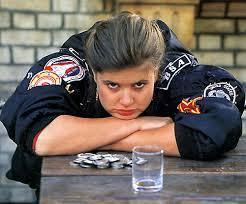 Ace gets some pretty good speeches, Doctor-style, about why she enjoys their life together. She also suggests that maybe the Doctor is trying not to get too attached to her because he knows she will leave him in the end… possibly an excuse for his mean behaviour? But not much of one.
Ace gets some pretty good speeches, Doctor-style, about why she enjoys their life together. She also suggests that maybe the Doctor is trying not to get too attached to her because he knows she will leave him in the end… possibly an excuse for his mean behaviour? But not much of one.
The story is also packed with continuity references, which was pretty appealing to my thirteen year old fannish self. Not only do Ace and the Doctor think back to past adventures a lot, but there are a couple of seriously cheesy “cameo” appearances – at the beginning, the Fourth Doctor appears, just after he has been playing with the Matrix in The Invasion of Time, to warn his future self of a vision he had of ‘the Timewyrm’ before it fades from his memory. Later, in the denouement, the Doctor admits that one of his former selves has greater scientific knowledge and abilities than himself, and induces the Third Doctor to come and inhabit his brain for a little while, describing the process “like a different faces of a multi-coloured cube.”
Now, that would be a cheap way to bring them all back for the anniversary. Matt Smith doing early Doctor impersonations, hmm?
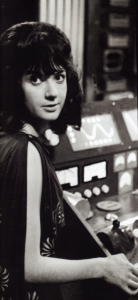 Oh, AND the TARDIS communicates danger by replaying clips from old episodes of former companions warning the Doctor, with a cool effect of the long-dead Katarina repeating the word ‘temple’ over and over again. It’s a CLUE!
Oh, AND the TARDIS communicates danger by replaying clips from old episodes of former companions warning the Doctor, with a cool effect of the long-dead Katarina repeating the word ‘temple’ over and over again. It’s a CLUE!
Also the villain is pretty awesome. She’s like – imagine if a cybernetic version of the Rani escaped, set herself up as a goddess on a primitive planet, ate brains, stole bodies and even – DUN DUN DUHHHHN – invaded the TARDIS computers.
The climax of the book (and yes I am going to spoil it, Doctor Who Book Club Podcast style, because it’s 20 years old and like other New Adventures books, almost impossible to get hold of, but do look away now if this is a problem for you) is pretty magnificent, with the Doctor luring a computer virus version of Ishtar into the TARDIS to save the world from a nasty planet-killing bomb, and then realising too late that she is not the sort of person you want tangled up in your telepathic circuits.
Even then he has a clever response – too clever – pulling a Brer Rabbit and the Tar Baby scenario to send virus-Ishtar to the circuits in the secondary control room, only to jettison that section of the TARDIS (sob!), banishing her to the vortex.
Which, of course, doesn’t kill her as expected, but allows her colossal time travel powers, and creates the Timewyrm, the villain we had been told to expect not only throughout this book, but linking the sequels in this mini-series of novels. Bad Doctor. No biscuit for you.
Now the Doctor and Ace have to face what they (well, he) have unleashed on the world… in the sequel! (no, I’m not going to read the sequel)
While the series was enough of a critical and commercial success to continue, the idea of a linking mini-series was soon dropped (after the follow up trilogy called Cat’s Cradle) and the book series continued monthly through the first half of the nineties. Often cited as an example of how media tie-in books can achieve greatness if allowed to create and build on their own canon (and if there isn’t a pesky current TV show around to get in the way), and ALSO as an example of how Doctor Who turns into something completely different if you allow it to get too dark and serious, the books served as a training ground for a new generation of Doctor Who writers and readers.
The first thing to go was any concession to a family audience – these books were written for adults, and much like Torchwood was criticised for more than a decade later, that sometimes meant dark, interesting and mature science fiction stories, and sometimes meant a bunch of sex, drugs and swearing stuck awkwardly into the text… Like Torchwood, though, this new freedom expanded the possibilities of the types of stories that could be told in a Doctor Who universe.
I started out reading the books compulsively, then sporadically, and later dipped in and out of them, choosing only the books by favourite writers or with particularly intriguing concepts. My favourites included Conundrum by Steve Lyons, Nightshade by Mark Gatiss, Human Nature and Happy Endings by Paul Cornell (SEE I FORGAVE HIM) and just about anything by Kate Orman – but particularly Return of the Living Dad and The Room With No Doors.
And so a long-running family adventure time travel TV show became a successful range of dark, weird science fiction books for grown ups… in which anything, absolutely anything, was possible.
PREVIOUSLY:
Agathon #12: The Mysterious Mr Quin (1930)
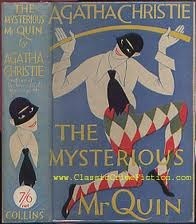 Kathryn and I started out with a challenge to read every book written by Agatha Christie, in order of publication – we’re blogging as we go along. We spoil all the things!
Kathryn and I started out with a challenge to read every book written by Agatha Christie, in order of publication – we’re blogging as we go along. We spoil all the things!
TANSY:
What a bizarre collection of stories!
I’m not sure if these are terribly meta or actually paranormal – it seems to me that in these tales Christie is actually pointing out the inherent ridiculousness of the coincidences and highly mannered events of her own novels by making the coincidence factor so terribly high that it borders on magic.
Satterthwaite and his odd friendship with Mr Quinn is a hard relationship to pin down – it feels almost seductive in some stories (totally slashtastic) and in others something more innocent and playful, reminiscent of when the Doctor breaks in a new companion in Doctor Who.
Many elements in the stories feel deeply like Christie – the characters and backgrounds – but the stories themselves are so tangled up with gothic romance, ghostly prediction and a kind of magical realism that they feel also totally unlike her other work.
I’m bewildered. What does the last story even MEAN? Did Mr Quin murder the Russian dancer himself? Is he Death? If he’s Death, why does he spend so much time trying to prevent tragedies and suicides, especially those involving young lovers?
Some of the stories are quite playful and fun – the one with the opal and the Chinese box made me laugh out loud. “He’s been in prison a year!” and they remind me at times of the Isaac Asimov Black Widowers short stories in their construction. I wonder at what the effect of them would be on their own, as originally published, rather than in this whole collection.
Still bewildering, I imagine.
Also, have they made THIS one into a Poirot or Miss Marple TV movie? Because I would really love to see how the hell they could manage it.
So, like, I think this is my favorite Christie short story collection to-date. Which is not to say that I loved it and want to marry it, but it did irritate me much less than I remember previous collections (note: I am am opting to AVOID rereading earlier entries to check the veracity of my memory!!)
I totally agree that this collection had a very different, almost mystical, tone compared to Christie’s other works to date (second note: from Christie’s foreword in my copy, she refers to Quin as ‘not quite human’,and that she wrote ghost stories before she wrote crime, which suggests that the paranormal notes were intentional, and Christie did indeed write SPECULATIVE FICTION). However, I think it’s for this reason that I was happy to accept a level of melodrama and coincidence that I would have found unbelievable in a Poirot or Tommy and Tuppence story (or Miss Marple, but we haven’t technically got to her yet).
I remain bemused by Mr Quin – he seemed to be just a useful plot point in more than one story. However, I did rather love Mr Satterthwaite, and his characterisation as a gossip who knows EVERYBODY (worth knowing, of course), but who also feels he lives outside of everything as an observer. It seemed to me that his character developed over the course of the collection (intentionally or not), and perhaps it was this development that made the collection more interesting for me, compared to the others where the main players have been previously developed in novels, and therefore remain fairly static.
In the forward to my copy, Christie also suggests that the collection also describes the story of the original Harlequin, but Wikipedia tells me there are many interpretations of Harlequin so I can’t work out which one she actually means… (Third note: I did check IMDB, though, and it does not appear that this particular work has been adapted for the small or large screen!)
PREVIOUSLY:
The Big Four (1927)
The Mystery of the Blue Train (1928)
The Seven Dials Mystery (1929)
Partners in Crime (1929)
COMING NEXT:
The Murder at the Vicarage (1930)
The Sittaford Mystery (also Murder at Hazelmoor) (1931)
May 26, 2013
Watching New Who: The Stolen Earth/Journey’s End
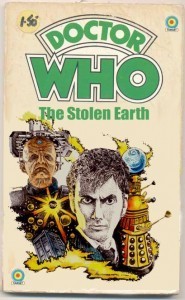 David is coming to New Who for the first time, having loved Classic Who as a kid. Tehani is a recent convert, and ploughed through Series 1 to 6 (so far) in just a few weeks after becoming addicted thanks to Matt Smith – she’s rewatching to keep up with David! Tansy is the expert in the “Doctor Who in Conversation” team, with a history in Doctor Who fandom that goes WAY back, and a passion for Doctor Who that inspires us all. We are working our way through New Who, using season openers and closers, and Hugo shortlisted episodes, and sometimes a couple of extra episodes we love as our blogging points. Just for fun!
David is coming to New Who for the first time, having loved Classic Who as a kid. Tehani is a recent convert, and ploughed through Series 1 to 6 (so far) in just a few weeks after becoming addicted thanks to Matt Smith – she’s rewatching to keep up with David! Tansy is the expert in the “Doctor Who in Conversation” team, with a history in Doctor Who fandom that goes WAY back, and a passion for Doctor Who that inspires us all. We are working our way through New Who, using season openers and closers, and Hugo shortlisted episodes, and sometimes a couple of extra episodes we love as our blogging points. Just for fun!
TEHANI:
I LOVED these episodes! ALL THE SPECIAL GUESTS MAKES FOR ALL THE HAPPY! Even more happy on the rewatch now that I’ve actually seen Torchwood and some Sarah Jane Adventures! There are problems which we’ll get to, yes indeedy, but OH, I do love the cramming in of everyone!
TANSY:
On rewatching yet again, I have to say that “The Stolen Earth” taken on its own is one of the best individual Doctor Who episodes of all time. There’s so much about it that is clever and good and epic, the bringing in of all those little plot strands for each character, the effects – it just all looks fantastic.
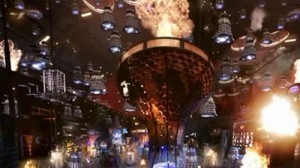 My three year old sat up straight and declared, “DALEKS CAN FLY?” when she saw this yesterday which frankly should not have been a shock to her, but I do think this is one of the best uses of that visual idea – and the shots of the Dalek saucers attacking the Earth are hardcore. These shots remind me of the gorgeous old Dalek comics that first (along with to a lesser extent the Peter Cushing movies) showed us how epic the Daleks could actually be with an excessive budget.
My three year old sat up straight and declared, “DALEKS CAN FLY?” when she saw this yesterday which frankly should not have been a shock to her, but I do think this is one of the best uses of that visual idea – and the shots of the Dalek saucers attacking the Earth are hardcore. These shots remind me of the gorgeous old Dalek comics that first (along with to a lesser extent the Peter Cushing movies) showed us how epic the Daleks could actually be with an excessive budget.
I’m so happy Doctor Who gets to show this stuff on screen now.
DAVID:
I’ve criticised RTD (Russell T Davies) a fair bit over the course of this review series, and I think justifiably so. But, credit where credit is due, at the back end of this season he really did do a wonderful job, and especially so with the finale. I really, really enjoyed these episodes, and as a fan, rather than a critic, I can’t remember anything that spoke to my inner fanboy and made him squee any more than this. And made him cry, but we will get to that. Yes, there are some bits that are a bit of a stretch, some very convenient resolutions and solutions, but these episodes are some much FUN that you really don’t care. It just grabs you and carries you along for the ride.
It’s things like this that show you that above all else, RTD is a fan. You may not always agree with the choices he makes, or the directions he goes, but you cannot fault the degree to which he cares about the show. His love for it shines through and, to me, covers a multitude of sins. And, every Doctor Who fan owes him a huge debt of gratitude for the fact we have New Who to watch.
 Firstly, how wonderful is it to see the “Children of Time”? It was just incredible having all the modern companions together again, and the best versions of them (with two exceptions which I will get to). Mickey is the grown up version, dare I say the man not the boy, Martha is competent and driven, and I really enjoyed having Jackie back (was she the Earth One version or the alternate world one? I’ve lost track!)! It made me want to go watch Torchwood, the brief glimpse of the characters and their dynamics made me think it would be wonderful, and I will definitely be watching the Sarah Jane Adventures now.
Firstly, how wonderful is it to see the “Children of Time”? It was just incredible having all the modern companions together again, and the best versions of them (with two exceptions which I will get to). Mickey is the grown up version, dare I say the man not the boy, Martha is competent and driven, and I really enjoyed having Jackie back (was she the Earth One version or the alternate world one? I’ve lost track!)! It made me want to go watch Torchwood, the brief glimpse of the characters and their dynamics made me think it would be wonderful, and I will definitely be watching the Sarah Jane Adventures now.
And, how can I forget K9? Good dog!
TANSY:
She is real Jackie but now living with Alter-Pete in Alter-Earth (we should totally call it CyberEarth or maybe PostCyberEarth). I love that all of the characters get their little moments and that includes Jackie – she doesn’t get a lot during the adventure itself but I enjoy how close she and Mickey are now, like real family, and that gorgeous touch right at the end where she tells the Doctor with a straight face that she named her baby after him.
DAVID:
For me, Captain Jack has been a bit all over the place, when they’ve got him right I’ve loved him, but when they didn’t I found him way too over the top. In this, though, he is spot on and I enjoyed every scene he was in. I especially enjoyed his interactions with Mickey – brilliant! I simply loved this Sarah Jane – she isn’t the one who put her life on hold, she is the one who built her own life after the Doctor, and a good one. RTD redeemed himself here, I feel.
TANSY:
I agree that this is a more believable Sarah Jane – coming after a whole season of her spin off series where they got to properly establish her, that makes sense – though it did bug me that she kept explaining over and over again that Luke was her son, it felt like a clumsy touch that wasn’t necessary.
TEHANI:
I’ve been watching The Sarah Jane Adventures this past couple of weeks though, and she does it a lot there as well. Trying to establish her as a maternal figure, for some reason?
TANSY:
I got that but it felt like she had to re-explain multiple times, rather than get to say anything else which was annoying since time was tight. We SAW Luke more than once, surely that was enough? Though I did like that it was clear she was differently motivated now – as a mother, she was willing to use more potentially violent threats against Davros.
It does feel a little – defensive about whether he is her real son or not? Which I guess is realistic, and some of her fears about that are explored in the series.
Oh how much did I LOVE that Davros remembered Sarah Jane from back in “Genesis of the Daleks”, and her terrified reactions to the Daleks and him? Excellent that she was able to be so visibly scared of them, but was cool and calm under all the other circumstances.
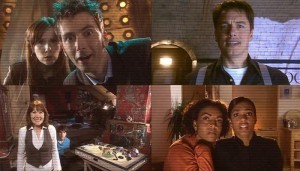 Back to more fun stuff, the meeting scene between most of the companions over Skype was pretty awesome, especially Jack and Sarah’s reactions to each other, and the scene in which Rose hangs out at Wilf and Sylvia’s place, miserable that she can’t join the party.
Back to more fun stuff, the meeting scene between most of the companions over Skype was pretty awesome, especially Jack and Sarah’s reactions to each other, and the scene in which Rose hangs out at Wilf and Sylvia’s place, miserable that she can’t join the party.
TEHANI:
Rose is hilarious in that scene! How she gets all sulky and like, “I did that,” and “Who is SHE?”
TANSY:
Yeah, after Martha having to be pouty about Rose I got a surprising amount of enjoyment from Rose getting jealous too. Possibly it worked best because Martha is now So Over the Doctor. I love love LOVE that Martha’s reaction to Rose’s return is entirely lacking in jealousy – she’s genuinely delighted for her friend to have her back. It not only reminds us of her lack of jealousy over Donna, but was a nice subtle apology for the mistakes the writers made in Season 3, I think.
DAVID:
While overall I thought Rose and Donna were excellent as well, I did find Donna’s “I’m not special” a bit tiresome after the tenth time, though I get why they stressed it, and Rose was a little bit too doe eyed. But, they were minor blips in some excellent characterisation, and as I said, this was all the companions at their best. Billie Piper does a great job of communicating how Rose feels about the Doctor, and how she struggles with the idea she is not the first companion in his life, nor the last. One can only wonder how she would have reacted to River Song. As for Catherine Tate, she continues to be magnificent, especially towards the end, which I am sure we will discuss!
TANSY:
Yeah it’s sad that Donna still feels that way about herself after we saw her acquit herself so brilliantly in “Turn Left” without the Doctor (which – does she remember or not at this point? They implied the memory was drifting away at the end). She has many great moments in this story, from her scenes with the Shadow Proclamation where she helps put the mystery together, to the quiet contemplative bits. I love the serious stuff with her but also the more arch comic scenes where she meets the Handy Doctor in the TARDIS and they totally try to outdo each other.
Harriet. What a great return for this character. It’s not often that someone proves to know better than the Doctor! I thought that, even though it was the Harriet Jones we’ve loved all along with her ID card and all, she brought a lot of dignity and gravitas to her role as the lynchpin of human resistance, and her sacrifice was one of the best in a long line in Doctor Who. As sad as it was to see her go, it truly was not in vain, and very powerful.
TANSY:
I like that the disturbing storyline about the Doctor bringing Harriet down came full circle, and the way she brings all the companions together and then sacrifices herself is magnificent. And of course, she was right all along. She dies purely so they can bring the Doctor to the Earth to save them – there’s no argument that there should be another way, for the Earth to defend itself without relying on the Doctor to be there.
I think Rose is very much in character and her love for the Doctor has to be as overt as it is here – and it’s likewise in character that the Doctor can’t quite deal with it. That final part where she demands he finish his sentence and he says “Does it need to be said?” That’s the Doctor right there! Squirming out of a commitment.
TEHANI:
What does that show though? That he DID love her (at the time) and moved on? Which, actually, makes sense in terms of how life generally works (and, pretty much, how the Doctor ALWAYS works).
I think he was over her at that point, but also – it does suggest to me he was never entirely capable of following through his genuine adoration of Rose into something that was romantic – or rather, real life romantic instead of ‘running around holding hands’ romantic.
I think he loved her, but his definition of love is sort of grandiose and theoretical. It strains under the pressure of real life, and the actual human expectations of another person who wants a relationship. So the only time he WAS prepared to tell her he loved her (probably) was seconds before he jumped ship to another universe.
Donna with a Time Lord brain is brilliant and wonderful and I hate that she wasn’t allowed to keep it. I hate her ending. It was such a devastating thing to do to a character who had damn well earned her hero stripes. The fact that he wipes her memory as she begs and pleads with him not to is … hard to accept.
TEHANI:
Horrible. Horrible horrible horrible ending and SO unfair. I know others have said they think it made sense in terms of the logic of the episode but I just think it was wrong. Donna didn’t deserve to lose it all, everything she’d seen, everything she’d done – unfair!
This was actually one of the most upsetting things I have seen on Doctor Who, in most television actually. It seemed unnecessarily cruel on behalf of the writer. It’s like they stripped away everything good that had happened to Donna and all the growth and happiness she had found, and reduced her back to a shallow caricature of herself. It was a bit of a slap in the face. Yeah, life doesn’t have happy endings, we get that, but I would struggle to come up with a crueler possible resolution to the story than that if I was trying! There is no reason why she couldn’t have lost her memories and met that guy from the Library – or even been sent to that virtual reality.Or anything rather than what happened.
Have I made it obvious how angry I was with that?
TANSY:
And I do wonder – especially having read A Writer’s Tale and knowing how long it took RTD to figure out all the details of this ending – if that had to be it for Donna. It feels like her storyline gets sacrificed at the end of this story (HER SEASON) so that Rose can have the happy ending. Why couldn’t Donna have been the one to be put in charge of the slightly sociopathic human Doctor? If you weren’t trying to have a romantic resolution, that would actually make more sense.
TEHANI:
Oh, no, I don’t like that interpretation at all! I’m not one of those people who has a problem with the idea of “sexytimes in the TARDIS” but I really don’t want to think Donna’s ending was sacrificed for the sake of ROMANCE!
TANSY:
I don’t know if I believe it, but after those great scenes of Donna as the Doctor it’s just sad to me that she’s not the one that gets the positive ending.
Catherine Tate performs her final scenes brilliantly – and Sylvia and Wilf are wonderful in those too. But it’s horrible, horrible. I think the most uncomfortable aspect about this is that every other companion gets that levelling up arc – sure the Doctor might not approve of the fact that most of his friends have got a bit more violent and ruthless since he saw them last (and BTW it’s quite adorable that Davros finds this hilarious), but we see all the companions as more grown up and independent and highly competent/qualified than when they were last in the TARDIS. They each get to improve on themselves, to grow up a bit in the Doctor’s absence, and to come back with even more to offer him as friends and equals. Even Jackie has her life more together than last time he saw her!
But Donna doesn’t get that. She gets the exact opposite of that. And coming so soon after “Turn Left” in which we were promised that without the Doctor she would turn into a hero anyway, it feels like a betrayal of the character that this time around, that isn’t going to happen.
If they were going to send her back to suburbia I would have much preferred it to be her choice, and to know she was going to do something great with her life – in the way she didn’t quite manage after “Runaway Bride”. And if they hadn’t spent the whole bloody season giving her lines like “I’m going to stay with that man forever” it would have been much easier to give her a great, satisfying ending without lobotomising her.
Yes, while I disagreed with the writing here, the acting – from everyone involved – was absolutely perfect. Wilf was as good as we have come to expect, but Sylvia, in particular, shows us a whole other side and left me with a whole different opinion of this character, especially after her coldness in “Turn Left”.
The scenes with Davros was another example of the respect shown for Classic Who. The idea that the Daleks would settle for nothing less than exterminating every other form of life, and would not feel safe until they had done so, was completely true to form. The Daleks have *always* been completely paranoid. But, where it really shone was how Davros holds up a distorted mirror to the Doctor, and speaks some very uncomfortable truths, not just about what the Doctor has done in the new series, but what he has done in the past.
The Doctor has turned companions into weapons before, as we saw with Ace in “The Curse of Fenric”. And, he has committed genocide on more than one occasion. As fans, we know that he is the “good guy”, that he is different than Davros, but it quite acceptable for Davros make us ask the question, why is he different?
So, what did everyone think about Dalek Caan? I loved the concept, loved the execution, I thought he was a great addition to the story.
TANSY:
I love several of the choices they made with Caan – particularly the idea of a Dalek prophet who LIES, because that’s a hilarious thing to do with a prophecy story – but also setting up a Dalek to be an actual character in his own right, and a foil to Davros.
DAVID:
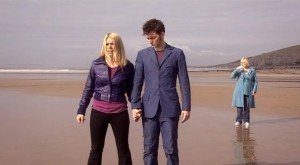 Watching the resolution to the story made me think, and wonder just how much New Who got away with because of David Tennant’s charisma. It is a very wibbly-wobbly solution, almost deus ex machina, but I found myself really not caring because it was just so much fun! Tennant has way of just carrying you along that is truly remarkable, and I think only rivalled by Tom Baker.
Watching the resolution to the story made me think, and wonder just how much New Who got away with because of David Tennant’s charisma. It is a very wibbly-wobbly solution, almost deus ex machina, but I found myself really not caring because it was just so much fun! Tennant has way of just carrying you along that is truly remarkable, and I think only rivalled by Tom Baker.
TANSY:
I think that’s absolutely true. The Tenth Doctor’s general enthusiasm, energy and adorableness does mean that a lot of things – not only plot holes and script faults, but some quite unpleasant character moments – are swept away under the force of yes, his charisma.
It was part of what made the show so very successful and popular during this era – but also I think a little bit of a poisoned chalice. I know many fans of the show who struggled to deal with the post-Tennant era of the show because they missed him and his presence so much – but of course, there are two sides to every coin and I know many others who didn’t get the hang of New Who UNTIL the Eleventh Doctor came along…
I don’t always love the Tenth Doctor but I do rather adore David Tennant, and the emotional layers that have become an essential element of the show.This story not only marks the end of Donna’s run as one of my favourite New Who companions, but also the end (for a year, but it felt like longer) of episodic, serial Doctor Who.
For everyone who is depressed by this episode’s ending, I want to share this with you:
I can now not watch that final scene without seeing that gif in my head. Thank you, internet.
TEHANI:
So we’re sad about Donna, and of course, it’s made worse by the fact that now we move into a very interesting period of the Doctor’s life – a companionless one. Allons-y!
PREVIOUS “New Who In Conversations”
“Rose”, S01E01
“Dalek”, S01E06
“Father’s Day, S01E08
“The Empty Child/The Doctor Dances”, S01E09/10
“Bad Wolf/The Parting of the Ways”, S01E12/13
Season One Report Card – David, Tansy, Tehani
“The Christmas Invasion,” 2005 Christmas special
“New Earth”, S02E01
“School Reunion,” S02E03
“The Girl in the Fireplace”, S02E04
“Rise of the Cybermen/Age of Steel”, S02E05/06
Army of Ghosts/Doomsday, S02E12/13
Season Two Report Cards: David, Tehani, Tansy
“The Runaway Bride”, 2006 Christmas Special
“Smith and Jones”, S03E01
The Shakespeare Code & Gridlock, S0302-03
Human Nature/The Family of Blood S0308-09
Blink S0310
Utopia / The Sound of Drums / Last of the Timelords S0311-13
“Voyage of the Damned,” 2007 Christmas Special
Season 3 Report Cards: David, Tehani, Tansy
Partners in Crime, S0401
The Sontaran Stratagem/The Poison Sky, S0405 S0406
Silence in the Library/Forest of the Dead, S0408 S0409
Turn Left, S0411
May 24, 2013
Splendid Six and his Coat of Many Colours
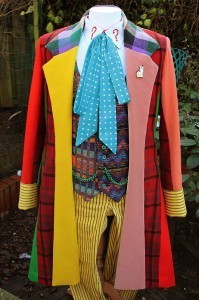 There’s a – not featuring me but still awesome & featuring a great deal of discussion about The Name of the Doctor. We’ve made it through our first season (well, half season) of weekly recording sessions and reviews! It will be quite odd to go back to the more measured pace we were managing before, and sometimes only speaking to the other Verities every month.
There’s a – not featuring me but still awesome & featuring a great deal of discussion about The Name of the Doctor. We’ve made it through our first season (well, half season) of weekly recording sessions and reviews! It will be quite odd to go back to the more measured pace we were managing before, and sometimes only speaking to the other Verities every month.
You can read ‘My Two Cents’ on The Name of the Doctor and the most recent Verity episode at the Verity blog, along with Erika’s ‘Last Word’ post. Join the discussion in the comments!
But the really super super exciting Doctor Who THING this week is that the next Splendid Chaps Live Show Podcast is now open for bookings. And I am in it!
If you haven’t been following them, Splendid Chaps is a mostly Melbourne-hosted phenomenon by John Richards, Ben McKenzie and Petra Elliott – every month they host a live show discussing one era of Doctor Who and a theme in front of a live audience, and then release a podcast of the show on the 23rd. The most recent episode, Five/Fear features my friend Narrelle Harris (who tells a Raeli anecdote, omg) and they have all been great listening.
So in a few weeks when I go to Melbourne for the Sisters in Crime dinner, I’ll also be appearing on Splendid Chaps: Six/Clothes, in which we talk about the marvels and challenges of the Colin Baker Years and issues to do with clothes, costume and fashion across the entire run of the show (I am assuming both on and off the screen).
So excited! They’re also requesting that audience members come along in cosplay or other Doctor Who clothing items (It’s not compulsory) so it should be a very fun event.
Hosts Ben McKenzie, John Richards and Petra Elliott are joined by writer and podcaster Tansy Rayner Roberts (Galactic Suburbia, Verity!), and another guest to be announced soon. We’ll also have a special musical performance, prizes, surprises – and a fashion show! Yes, we want to see your best cosplay and Doctor Who related sartorial creations – and there will be prizes on offer.
Space: Agent 284, 284 Smith Street, Collingwood
Time: Saturday, June 15; recording starts 4 PM
Accessibility: We regret that this venue is not wheelchair accessible.
Tickets: $15 (plus booking fee where applicable)
Bookings: via trybooking.com or at the door (subject to availability)
Podcast: not yet available; released 23rd of June, 2013.
The homework for this episode, should you choose to accept it, is:
Colin Baker era: Revelation of the Daleks, Vengeance on Varos, The Mysterious Planet
Clothes: The Chase, the Talons of Weng-Chiang, The Robots of Death, Black Orchid, Gridlock (I don’t get that last one either!)

